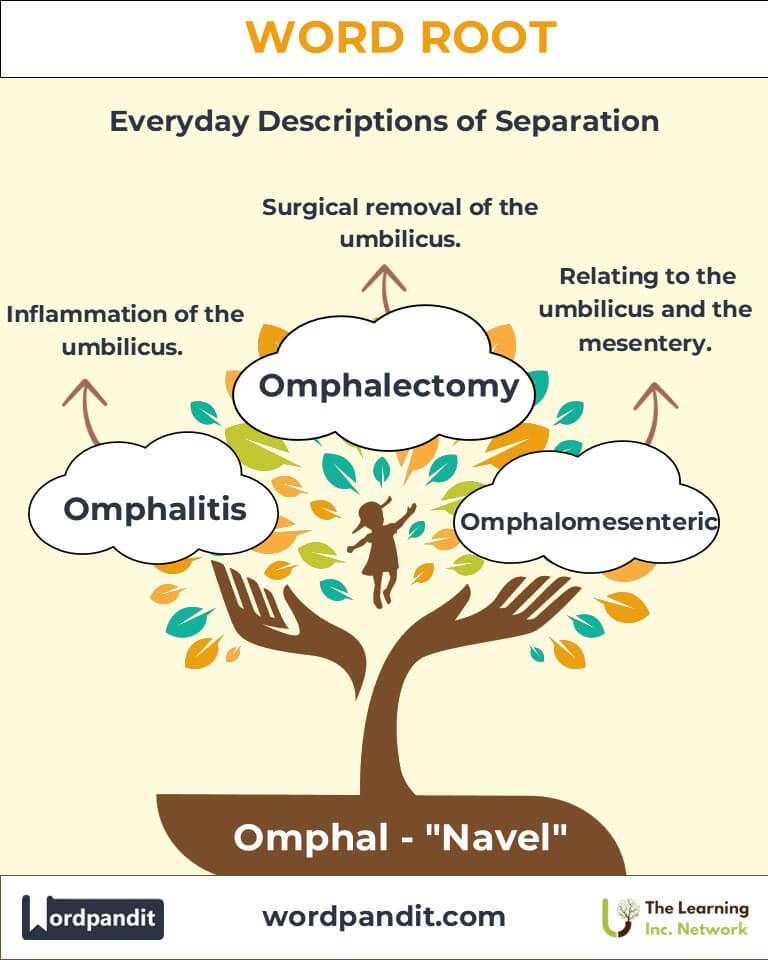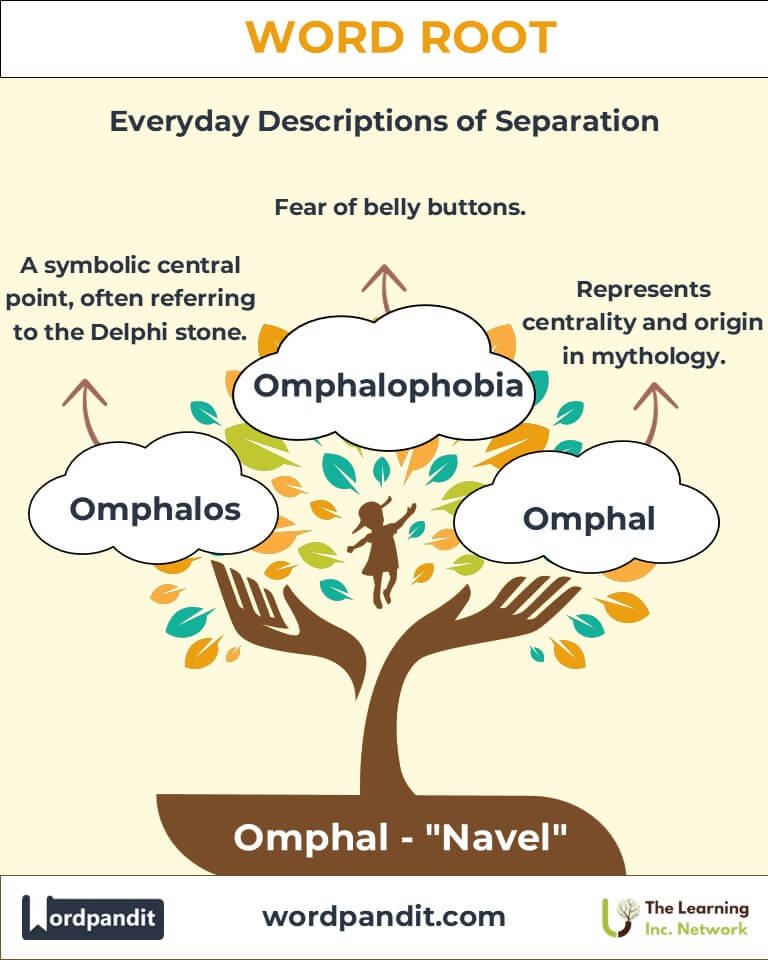Omphal: Exploring the Root of the Navel Across Language and Culture
Dive into the fascinating world of the word root "Omphal," derived from the Greek word for "navel" or "umbilicus." From its ancient origins to its presence in modern terminology, "Omphal" links us to notions of centrality, connection, and life itself. Through terms like "omphalos" and "omphalitis," this root bridges anatomy, mythology, and medical science.

Table of Contents
- Introduction: The Center of Omphal
- Etymology and Historical Journey
- Mnemonic: Unlocking the Power of Omphal
- Common Omphal-Related Terms
- Omphal Through Time
- Omphal in Specialized Fields
- Illustrative Story: Omphal in Action
- Cultural Significance of Omphal
- The Omphal Family Tree
- FAQs about the Omphal Word Root
- Test Your Knowledge: Omphal Mastery Quiz
- Conclusion: The Living Legacy of Omphal
Introduction: The Center of Omphal
The word root "Omphal" (pronounced om-fal) comes from the Greek word omphalos, meaning "navel" or "center." This root is deeply symbolic, representing connection, origin, and the hub of activity. From ancient myths about the "navel of the world" to modern medical terminology, "Omphal" reveals the centrality of the navel in both language and life.

Etymology and Historical Journey
"Omphal" originates from the Greek omphalos, meaning "navel" or "umbilical cord." In Greek mythology, the Omphalos Stone at Delphi was believed to mark the Earth's center, emphasizing the root's symbolism of centrality and origin. Over time, this root found its way into anatomical and medical lexicons, describing structures and conditions related to the umbilicus.
Mnemonic: Unlocking the Power of Omphal
To remember "Omphal," visualize the umbilical cord as a lifeline connecting a baby to its mother, much like the word root connects us to ideas of origin and centrality.
Mnemonic Device:
"Omphal is the cord of life, tying us to our beginnings."
Common Omphal-Related Terms
- Omphalos (om-fal-ohs):
Definition: The navel or a central point.
Example: "The ancient Greeks considered Delphi the omphalos of the world." - Omphalitis (om-fal-eye-tis):
Definition: Inflammation of the umbilicus.
Example: "The newborn was treated for omphalitis to prevent complications." - Omphalophobia (om-fal-oh-foh-bee-ah):
Definition: Fear of belly buttons.
Example: "Her omphalophobia made her avoid tight clothing that revealed the navel." - Omphalomesenteric (om-fal-oh-meh-sen-ter-ik):
Definition: Relating to the umbilicus and the mesentery.
Example: "Omphalomesenteric abnormalities can affect newborns." - Omphalectomy (om-fal-ek-tuh-mee):
Definition: Surgical removal of the umbilicus.
Example: "The patient underwent an omphalectomy due to a severe infection."
Omphal Through Time
- Ancient Symbolism: The Omphalos Stone at Delphi symbolized the Earth's center, a spiritual and geographical focal point.
- Modern Medicine: The term has adapted to describe medical conditions like omphalitis, emphasizing its anatomical relevance.
Omphal in Specialized Fields
- Mythology and Culture: The Omphalos Stone symbolizes centrality in ancient Greek beliefs.
- Medicine: Terms like omphalitis and omphalectomy describe conditions and procedures related to the navel.
- Psychology: Omphalophobia reflects how the navel, though mundane, can evoke strong psychological responses.
Illustrative Story: Omphal in Action
Little Maya was born prematurely, and her parents were worried when doctors diagnosed her with omphalitis. With prompt medical care, the inflammation was treated successfully. Years later, as a curious teenager, Maya visited the ancient site of Delphi, where the Omphalos Stone stood. Her journey highlighted the profound connections between her personal health and humanity's shared myths about origins.
Cultural Significance of Omphal
The "Omphal" root signifies more than just the navel. In many cultures, it symbolizes life, connection, and the universe's center. From ancient Greek myths to modern psychological studies, the root reflects how centrality and origins shape human understanding and experiences.

The Omphal Family Tree
- Umbil- (Latin: navel):
- Umbilicus: The navel.
- Umbilical: Pertaining to the umbilical cord.
- Nav- (Latin: ship/navel):
- Navigate: To steer a course.
- Naval: Relating to ships or fleets.
- Centro- (Greek: center):
- Central: Located at the core.
- Centroid: The center of mass in a geometric object.

FAQs About the Omphal Word Root
Q: What does "Omphal" mean?
A: "Omphal" is derived from the Greek word omphalos, which means "navel" or "umbilicus." It is associated with centrality and origins, both in anatomy (the umbilical cord) and in symbolism (the center of the Earth in mythology).
Q: What is the significance of the Omphalos Stone?
A: The Omphalos Stone was a sacred artifact in Delphi, Greece, believed to represent the "navel of the world." Ancient Greeks considered it a symbolic connection between the heavens and the Earth, marking the center of spiritual and geographical significance.
Q: What is omphalitis, and how is it treated?
A: Omphalitis is an infection or inflammation of the umbilicus, typically occurring in newborns. If untreated, it can lead to severe complications. Treatment usually involves antibiotics and, in severe cases, drainage or surgical intervention.
Q: What is omphalophobia, and why do some people have it?
A: Omphalophobia is the irrational fear of belly buttons, whether touching them, having them touched, or seeing others' navels. This phobia might stem from sensory hypersensitivity, past trauma, or a symbolic aversion tied to the navel's connection to the body.
Q: What is an omphalectomy, and when is it performed?
A: An omphalectomy is a surgical procedure to remove the umbilicus, often done in cases of severe infection, tumors, or certain abdominal surgeries. It is a rare but medically significant operation.
Q: How is the word "Omphal" relevant in mythology?
A: In mythology, "Omphal" ties to ideas of centrality and origin. For instance, the Omphalos Stone at Delphi symbolized the Earth's center, reflecting the Greeks' belief in interconnectedness between divine and earthly realms.
Q: Are there modern uses of "Omphal" in scientific contexts?
A: Yes, terms like omphalomesenteric and omphalectomy are used in anatomy and medicine. These words highlight the continued relevance of the root in describing structures and medical conditions related to the umbilicus.
Test Your Knowledge: Omphal Word Root Quiz
1. What does "Omphal" mean?
2. What is omphalitis?
3. What does "Omphalos" symbolize in Greek culture?
4. What is omphalophobia?
5. What is an omphalectomy?
Conclusion: The Living Legacy of Omphal
The root "Omphal" is a powerful reminder of humanity's connection to origins, centrality, and life itself. From ancient myths to modern medicine, it serves as a linguistic and symbolic bridge across time and disciplines. Whether we explore its role in cultural traditions or scientific innovations, "Omphal" roots us in a deeper understanding of our shared humanity.














